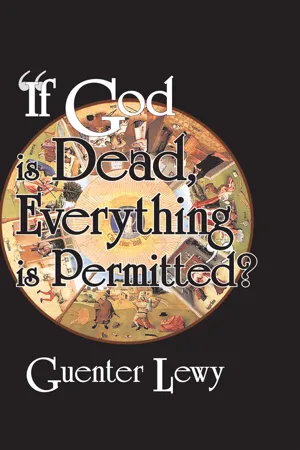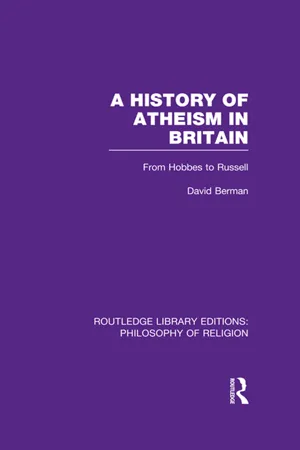Atheism in the Enlightenment
Atheism in the Enlightenment refers to the emergence of atheistic thought during the 17th and 18th centuries in Europe. Influenced by scientific and philosophical advancements, Enlightenment thinkers began to question traditional religious beliefs and advocate for secularism and rationalism. This period marked a significant shift in attitudes towards religion and the role of reason in shaping societal values.
6 Key excerpts on "Atheism in the Enlightenment"
- eBook - ePub
- Guenter Lewy(Author)
- 2017(Publication Date)
- Routledge(Publisher)
...2 The Enlightenment: From Skepticism to Unbelief The age-old notion that religious belief is essential for moral virtue underwent its most radical questioning during the eighteenth-century Enlightenment, especially in France, but of course this was not the first time that such a challenge had been put forth. Back in classical antiquity, Plato had insisted that atheists had to be punished because of the danger they posed to society, but at the same time he had acknowledged that among the different kinds of the impious there existed he “who does not believe in the Gods, and yet has a righteous nature, hates the wicked and dislikes and refuses to do injustice, and avoids unrighteous men, and loves the righteous.” 1 During the Renaissance, the writings of Plato and other ancient classics became a foil for challenging and undermining the prevailing Christian orthodoxy, and the same role was played by the missionary and travel literature that described highly civilized non-Christian societies composed of virtuous atheists. The finding that there existed morally upright nonbelievers in various parts of the world could not but weaken the accepted conviction that the only and essential safeguard of morality was the Christian religion. The question of atheistic virtue was raised during the debate among French theologians on the issue of Chinese philosophy and religion. Between 1660 and 1714, the “Chinese rites” controversy produced more than 130 books in France alone; many others were published in Amsterdam, Cologne, and other centers of publishing. 2 The controversy initially was not about Chinese atheism. It concerned the question of whether Confucianism reflected some original Chinese understanding of divine revelation and whether the Jesuits therefore could build upon Confucian moral philosophy and rituals in the process of seeking to convert the Chinese to Christianity...
- eBook - ePub
The Philosophy of the Enlightenment (Routledge Revivals)
The Christian Burgess and the Enlightenment
- Lucien Goldmann(Author)
- 2009(Publication Date)
- Routledge(Publisher)
...The philosophes were battling against a faith whose content had been taken from it by the very social and economic processes that had promoted the growth of individualism; this faith had accordingly acquired much the same structural character as the Enlightenment itself. Had it been carried to its logical conclusion, this attenuated faith would have ended in theism, deism, or even atheism; but, just because it was not thought out logically, it turned into superstition and bigotry. As Hegel saw, this fact provides the historical justification for the critical attacks on religion made by the Enlightenment. But it must not be forgotten that Christian belief, however weakened, entailed some content in human thought and action even in the eighteenth century, and continued to assert that such a content was necessary. It was this requirement which led the German idealist and dialectical philosophers to undertake the major task of discovering a valid and authentic system to replace individualism. I shall return to this point in the last section of this essay, where I shall consider to what extent the effort met with success. Earlier in this study I sketched the main features of Hegel’s analysis in the Phenomenology, and that alone will have shown the difficulty of fixing the place of the Enlightenment in the history of ideas...
- eBook - ePub
Philosophy of Education
An Encyclopedia
- J.J. Chambliss(Author)
- 2013(Publication Date)
- Routledge(Publisher)
...For example, philosophers of the ancient world such as Epicurus and Lucretius were nonbelievers, and leading thinkers of the Enlightenment such as Baron d'Holbach and Diderot were professed atheists. Even in the Middle Ages there were skeptical and naturalistic currents of thought. Expressions of nonbelief are found, moreover, in the literature of the Western world: in the writings of Mark Twain and Upton Sinclair; Shelley, Byron, and Thomas Hardy; Voltaire and Jean-Paul Sartre; and Turgenev. Today, nonbelievers are found from the Netherlands to New Zealand, from Canada to China, from Spain to South America. According to the 1993 World Almanac, in 1991 there were about 1.2 billion nonbelievers in the world. This means that about 22 percent of the world's population are nonbelievers. Atheism should not be confused with other”isms” such as humanism, rationalism, naturalism, skepticism, and agnosticism, or with movements such as Ethical Culture and Free Thought. Although the relation between atheism and these other positions is complicated, atheism is not identical with any of them. For example, there have been atheists who were not humanists and humanists who were not atheists; not all members of the Free Thought or Ethical Culture movements were atheists; rationalists have sometimes been believers, and followers of so-called atheistic religions have not always been naturalists. Furthermore, negative atheism (not having a belief in God) is compatible with agnosticism, while positive atheism (affirming the nonexistence of God) is incompatible with neither affirming nor denying the existence of God. Some religions, such as Jainism, certain forms of Buddhism, and Auguste Comte's religion of Humanity, do not include a belief in a theistic God. Whether these warrant the title”atheistic” depends on the meaning of atheism. In the case of Jainism, although there is no belief in a creator God, there is belief in numerous gods within the cosmos...
- eBook - ePub
- Anthony C. Thiselton(Author)
- 2015(Publication Date)
- Eerdmans(Publisher)
...Chapter IV The Challenge of Atheism: Lessons for Christians 1. The Origins of Atheism: A Simple, Materialist View of Humankind From the ancient world up until the post-Reformation era, belief in God or the gods was deemed to be relatively “normal.” Explicit atheism was largely an exception. Admittedly, Democritus (mid-fifth to fourth century b.c.) appeared to teach an implied atheism as a part of his theory of atoms. Epicurus (341-270 b.c.) shared a similar viewpoint. Although their philosophies were influential, these views were not the norm. Even Thomas Hobbes (1588-1679), in spite of his criticism of popular religion, did not commit himself to explicit atheism. He did, however, promote a materialist view of the world. Everything, he urged, is generated by causal forces or human appetites and passions. “Religion” is largely due to ignorance of second causes. In his political treatise Leviathan (1651), the supreme power is the state, especially the monarch. A social contract, primarily built on self-interest, prevents civilization sliding back into the remote past, when, as is often quoted, life was “solitary, poor, nasty, brutish, and short.” As David Berman shows in his history of atheism, British government legislation in 1677-1678 and in 1697 tended to drive explicit atheism underground. Nevertheless, without doubt many in England, at least in the upper classes, regarded Hobbes’s philosophy as implying atheism, which they adopted. 1 Berman cites a number of “free thinkers,” including John Wilmot, earl of Rochester, who even believed in a Supreme Being, and could not think that the world came into being through mere chance. He characterized such a being as “a vast power,” even if not “personal.” Hobbes himself was ambiguous. Much more explicit in his earlier atheism was Daniel Scargill in his work Recantation (1669). In this work he recants his previous denial of God as “dangerous and malicious.” He explained that, in the past, he “gloried to be. ....
- eBook - ePub
- John M. Frame(Author)
- 2015(Publication Date)
- P Publishing(Publisher)
...That included Scripture and church tradition. Like the early Greek thinkers, Descartes sought to replace that tradition with a new system of knowledge based on human autonomous reason alone. His project, and that of the other “modern” philosophers, was not like that of the medievals, to combine the Christian and Greek ways of thinking, but rather to embrace a completely new, consistently autonomous system of philosophy. To be sure, the modern philosophers did claim to be religious in various ways. Frequently their systems incorporated a concept of god. But even in the more religious systems, that god did not reveal himself in such a way as to govern their thinking about the world. The modern philosophers found it no easier than the Greeks to impose autonomous rational thought on a world of recalcitrant fact. They disagreed over many things, particularly the relative roles of reason and sense. But even when (as in Hume) modern philosophers veered toward skepticism, they grasped tightly to the claim of autonomy and showed no interest in compromising that fundamental point. They did not call out to God for intellectual salvation. Such was the period from 1600 to 1800, often called the Enlightenment or the age of reason. 326 From a Christian view, it was a time of darkness rather than enlightenment, but these names have become conventional labels for this period in history. Of course, there is more to be said about this period. As I noted, the Protestant Reformation was still gaining converts at this time. And Roman Catholics were maintaining the medieval traditions of philosophy. So it might have seemed as though the two approaches could carry on concurrently: modern secularism and Christian philosophy. That happened to some extent...
- eBook - ePub
A History of Atheism in Britain
From Hobbes to Russell
- David Berman(Author)
- 2013(Publication Date)
- Routledge(Publisher)
...So Spinoza was regarded by most seventeenth-century and early eighteenth-century writers as a theoretical atheist. But late eighteenth-century German writers, like Lessing and Novalis, hardly agreed; nor would Spinoza himself have agreed. Again, a deist, such as Paine, was regarded by most contemporary churchmen as a practical atheist (for alleged blasphemy, among other things), yet Paine not only repudiated the charge of practical atheism but vigorously returned it. 3 Qualifications, additions and modifications will, as we shall see, be necessary; but my aim has been to let these things develop and work themselves out historically. II. The orthodox position: Locke and Berkeley In his Letter concerning toleration (1689) Locke refuses toleration to those ‘who deny the being of God’. 4 One reason he gives for this intolerance is that: ‘Promises, covenants, and oaths, which are bonds of human society, can have no hold upon an atheist. The taking away of God, though even in thought, dissolves all.’ Although Locke does not use the term ‘theoretical atheism’ here, the ‘taking away of God in thought’ is a fairly good characterisation of it. This is even clearer in the case of the partner conception. For breaking promises seems to have been regarded as a prominent way in which practical atheism was exhibited. Moreover, in the Essay concerning human understanding (I.iv.8) Locke provides an even better characterisation of practical atheism; he speaks of some ‘wretched profligates’, whose lives ‘proclaim their atheism’. This he distinguishes from the atheism which is verbally proclaimed. But we must still ask why, in Locke’s view, theoretical atheism must lead to moral chaos, i.e. to the dissolving of promises and oaths. Part of his answer is to be found in Essay, II. xxviii, where we learn that it is God who both produces and enforces moral laws. Hence, if we did not believe in God we would, presumably, be removing the basis of morality...





